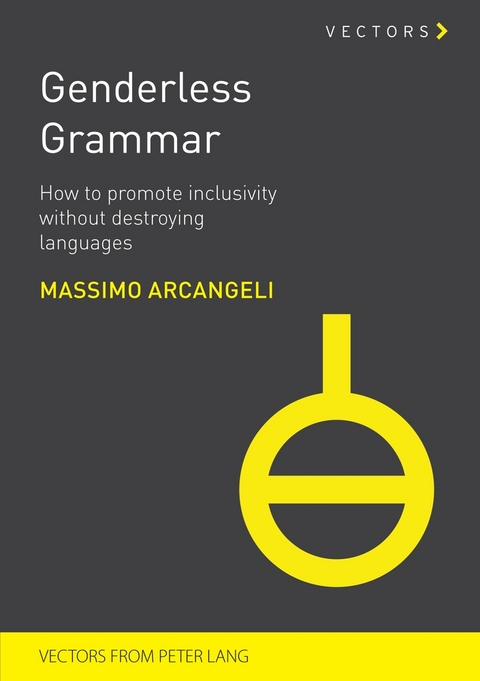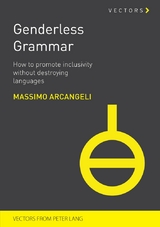Genderless Grammar
How to Promote Inclusivity without Destroying Languages
Seiten
2023
|
New edition
Peter Lang AG, Internationaler Verlag der Wissenschaften
978-2-87574-742-6 (ISBN)
Peter Lang AG, Internationaler Verlag der Wissenschaften
978-2-87574-742-6 (ISBN)
- Titel nicht im Sortiment
- Artikel merken
How to promote inclusivity without destroying languages and erasing centuries of linguistic and cultural stratification with a bang (considering it would spell defeat for the whole of humanity): the truth is, in the end, there’s a solution to every problem
Attempts to conceal grammatical gender, dictated by the "inclusive" desire to overcome the simple distinction between masculine and feminine (gender binarism) and make room for the neutral, affect the national languagesof a variety of Western countries with increasing frequency and intensity, with the risk of weakening or compromising the functioning of the languages’ supporting structures. A grammatical innovation has a very different impact from a neologism, and when that innovation, under the excuse of inclusion, ends up infiltrating a public act, or any other text issued or produced by a public entity, penetrating it in a pervasive way, the institutional endorsement should set off the alarm bells. In our case, simplicistically overlapping two levels that must instead be kept distinct – one "structural" (technical-linguistic) and the other "superstructural" (socio-cultural) – means that, in the growth economy of an entire community of speakers and writers, the structures of an idiom, above all if stratified over time, are bent to accommodate the desires of those who, against all logic and the most elementary common sense, expect immediate changes that would upset or crack the linguistic system. This ends up making even the simple decodingof information difficult.
Attempts to conceal grammatical gender, dictated by the "inclusive" desire to overcome the simple distinction between masculine and feminine (gender binarism) and make room for the neutral, affect the national languagesof a variety of Western countries with increasing frequency and intensity, with the risk of weakening or compromising the functioning of the languages’ supporting structures. A grammatical innovation has a very different impact from a neologism, and when that innovation, under the excuse of inclusion, ends up infiltrating a public act, or any other text issued or produced by a public entity, penetrating it in a pervasive way, the institutional endorsement should set off the alarm bells. In our case, simplicistically overlapping two levels that must instead be kept distinct – one "structural" (technical-linguistic) and the other "superstructural" (socio-cultural) – means that, in the growth economy of an entire community of speakers and writers, the structures of an idiom, above all if stratified over time, are bent to accommodate the desires of those who, against all logic and the most elementary common sense, expect immediate changes that would upset or crack the linguistic system. This ends up making even the simple decodingof information difficult.
Massimo Arcangeli is a linguist, literary critic and writer. He teaches Italian Linguistics at the University of Cagliari, directs numerous cultural festivals, collaborates with public radio and television and with some of the most important national newspapers.
Massimo Arcangeli: The "dictatorship" of political correctness- Gender equality and inequality. From the "overextended" male to contemporary feminisms- In the name of the neutral. The schwa and other "transgender" graphic symbols- Inclusiveness in various languages. Requests, problems, solutions
| Erscheinungsdatum | 22.03.2023 |
|---|---|
| Zusatzinfo | 16 Illustrations |
| Verlagsort | Pieterlen |
| Sprache | englisch |
| Maße | 148 x 210 mm |
| Gewicht | 155 g |
| Themenwelt | Geisteswissenschaften ► Philosophie ► Sprachphilosophie |
| Geisteswissenschaften ► Sprach- / Literaturwissenschaft ► Sprachwissenschaft | |
| Sozialwissenschaften ► Soziologie ► Gender Studies | |
| ISBN-10 | 2-87574-742-8 / 2875747428 |
| ISBN-13 | 978-2-87574-742-6 / 9782875747426 |
| Zustand | Neuware |
| Haben Sie eine Frage zum Produkt? |
Mehr entdecken
aus dem Bereich
aus dem Bereich
Aspekte einer Ontologie des Logos
Buch | Hardcover (2024)
Springer Fachmedien (Verlag)
119,99 €
Wie die Menschheit zu ihrer größten Erfindung kam
Buch | Softcover (2022)
C.H.Beck (Verlag)
18,00 €
Macht und Legitimität politischer Sprache im Prozess der europäischen …
Buch | Softcover (2023)
Nomos (Verlag)
74,00 €




